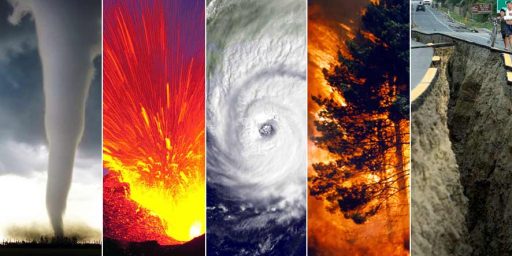Tsunami Death Toll Tops 100,000
Death Toll Rises to 76,700 Tsunami Victims in Asia; Red Cross Says Dead Could Exceed 100,000 (ABC)
Cargo planes touched down with aid Wednesday, bearing everything from lentils to water purifiers to help survivors facing the threat of epidemic after this week’s quake-tsunami catastrophe. The first Indonesian military teams reached the devastated west coast of Sumatra island, finding thousands of bodies and increasing the death toll across 12 nations to more than 76,700.
The international Red Cross warned that the toll could eventually surpass 100,000.
Town after town along the Sumatran coast was covered with mud and sea water, with homes flattened or torn apart, an Associated Press reporter saw on a helicopter overflight with the military commander of the island’s Aceh province. The only signs of life were a handful of villagers scavenging for food on the beach. Western Sumatra suffered a double blow in Sunday’s disaster, shattered both by the most powerful earthquake in 40 years and perhaps the deadliest tsunami in recorded history, which wreaked destruction across a dozen nations. “The damage is truly devastating,” Maj. Gen. Endang Suwarya said. “Seventy-five percent of the west coast is destroyed and some places it’s 100 percent. These people are isolated and we will try and get them help.” The first military teams reached the devastated fishing town of Meulaboh on Sumatra’s coast and across the coast they found thousands of bodies, bringing Indonesia’s toll to 45,268, with 1,240 reported missing, according to the Health Ministry’s official count. That toll was likely to rise one official on Tuesday estimated that as many as 10,000 people were dead in Meulaboh alone.
The race was on to try to prevent an outbreak of diseases and curb food shortages among millions of homeless, which the U.N. health agency said could kill as many as the waves and quake. While Sri Lanka said it was getting its first reports of measles and diarrhea, paramedics in southern India began vaccinating 65,000 survivors against cholera, typhoid, hepatitis A and dysentery.
Mindboggling. And Daniel Aronstein is right: creating mass graves will only add to the death toll. Cremation is the logical alternative. Of course, expecting people to compound the misery of losing family members–perhaps several of them–by defying deeply-ingrained religious and cultural traditions because it’s scientifically sound is probably asking too much.
Update (1259): I misunderstood Aronstein’s argument. See this follow up post.
Update (1358): Andrew Gilligan reports that the death toll has already topped 100,000:
The death toll in the tsunami disaster soared past 100,000 today – and is set to climb higher. A total of 50 Britons are now confirmed dead and at least 100 are unaccounted for after tidal waves swept away resorts in Thailand, Sri Lanka, India and around the Indian Ocean. Officials in every country today warned the final number of dead will be even higher as rescue teams reach remote areas.
The UN said there were now strong grounds to believe that the toll in the Sumatran province of Aceh, the worst affected area, would be as high as 80,000. The number dead has now climbed in every country affected, including:
- Thailand: 1,700 confirmed dead, including 43 British tourists.
- Indonesia: more than 42,000 confirmed dead.
- India: nearly 7,000 dead, and many coastal areas including parts of Kerala still to be searched.
- Sri Lanka: 22,500 are confirmed dead and there are fears for hundreds of independent British travellers on the east coast.
These numbers are unfathomable.




The agency’s officials said Tuesday that because there was little danger of epidemics from unburied bodies
Don’t know why this should surprise anyone. Dead bodies aren’t good hosts for most human pathogens.
It’s the crowding of large numbers of weakened people into refugee camps with poor sanitary conditions that poses the risk for epidemics. Weakened people are ideal hosts for pathogens and their close proximity makes transmission of disease difficult to avoid.